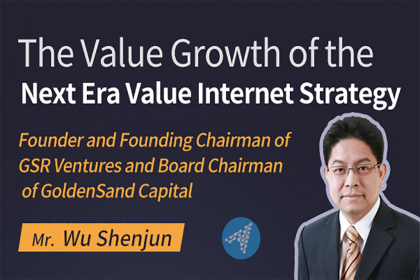
Interview with Wu Shenjun: The Value Growth of the Next Era Value Internet Strategy

With the development of the digital economy, emerging technologies such as 5G, the Internet of Things, artificial intelligence, and big data have emerged endlessly, and the global Internet industry shows a comprehensive information explosion, against which background the data crisis has become apparent. Centralized data logic such as storage and search are facing many challenges, and the information Internet is facing huge challenges.
At present, the revolutionary and innovative blockchain technology has been gradually applied to the ground, and the global value Internet will be gradually realized. The birth of blockchain-based IPFS distributed storage opened up the era of distributed data, and IPFS-based IPSE distributed search has occupied the traffic entrance of the global value Internet era, with huge value potential.
As the top international fund to invest in IPSE, Mr. Wu Shenjun, founder and founding chairman of GSR Ventures and board chairman of GoldenSand Capital, has a unique and in-depth understanding of IPSE. The investment in IPSE marks its layout of blockchain industry and value Internet.
The GSR Matrix Fund is a capital established by GoldenSand Capital to invest in high-quality projects in the digital economy and digital finance fields. We asked Mr. Wu to briefly introduce the GSR Matrix Fund.
Mr. Wu said:
“The GSR Matrix Fund was jointly established by GoldenSand Capital, Mr. Liang Jieyang, founding chairman of the Blockchain Association of Hong Kong, and Mr. Xu Ander, founding chairman of the Global Blockchain Investment Alliance and it is a special fund for the main investment areas such as artificial intelligence, blockchain, cloud computing, Big data, the Internet of Things (ABCDI).
As an accelerator in the high-growth field, the GSR Matrix Fund is committed to ushering in a new round of technological revolution and a wave of informatization in the world. All economic and social fields, including the financial industry, are accelerating to digital, networked, and intelligent development, which promotes the transformation and upgrading of the global digital economy.
Since the establishment of the GSR Matrix Fund, its focus has been on the layout of the blockchain and global value Internet fields and the representative investment project is the IPSE distributed search engine.”
As a distributed search engine based on IPFS, IPSE plays an important role in the next generation of value Internet. We asked Mr. Wu’s reason for investing in IPSE.
He told us:
“IPFS is a revolutionary, innovative and disruptive global data industry fundamental protocol in the distributed data age. Owing to advantages of being efficient, fast, high security, and saving resources, IPFS will gradually replace HTTP protocols that has great pains in access, storage, security, and privacy in the era of big data.
Once decentralization is achieved through IPFS, Internet access will undoubtedly be faster and more bandwidth resources will be saved; moreover, it will play an increasingly important role in network security, data network “over-redundancy” and privacy protection.
It can be said that IPFS has elevated the Web to a new level and is a powerful infrastructure for the next generation of value Internet. IPFS has a revolutionary influence in technology, but the incomprehensible nature of its data label, the hash value, seriously hinders the application of IPFS.
IPSE is a distributed search ecosystem based on IPFS. It is a search layer application on top of IPFS infrastructure. The birth of IPSE brings IPFS to real industrial applications. The most important point is that IPSE presents the content in IPFS in a way that humans can understand, which has laid a solid foundation for IPSE to occupy the next generation of value Internet portals.
Technically speaking, IPFS maps the content to a hash address, and IPSE maps the hash address to a semantic tag that humans understand and users only need to retrieve the tag to find the content. Users can share content resources, add tags to complete mining, and get token incentives.
Super nodes can expand the storage of index data horizontally and provide stable search services. Based on the IPFS network, the storage of copyright and paid content reduces storage and bandwidth costs. At the same time, it is distributed directly to all users through IPSE to build a strong IPFS + IPSE ecosystem.
IPSE has great value potential in the IPFS application layer, and in the economic layer, it will realize decentralized incentives for global IPSE miners. IPSE builds a POST incentive layer based on IPFS and users can provide index computing power and bandwidth resources to help others implement IPFS-based content invocation.
Based on this, the IPSE network will continue to expand and the number of nodes will grow geometrically. From the perspective of network economic value, the IPSE network value will grow exponentially.”
IPSE is indeed an epoch-making project. We are wondering what problems does IPSE solve? Or what is the value of IPSE?
Mr. Wu held the view that:
“Overall, the value of IPSE comes from its disruptive innovation to the search ecosystem and the important role of traffic entry in the age of value interconnection.
Specifically, IPSE proposes highly innovative, revolutionary decentralized, distributed solutions from three levels. For the index traceability issue, IPSE proposes to use an incentive mechanism to integrate data traceability to give data creators an incentive to participate in the establishment of a distributed data network.
For data storage, a decentralized storage system is used, data encryption is implemented using hash encryption, and high data throughput is achieved with sharding technology to ensure the efficiency of data management. For the use of ports, DApps are used instead of Apps. Smart contracts reduce data management costs and improve system efficiency.”
The implementation of IPSE distributed search must accompany the expansion of the global B-side and C-side user groups. In terms of application ecology, we asked Mr. Wu’s opinions about what can IPSE bring to users.
Mr. Wu answered:
“IPSE is a distributed search engine in the first place, but it is not limited to search itself. Searching can be said to be an entry point for IPSE. IPSE has a very valuable decentralized spirit. Under distributed storage and search logic, bandwidth and storage resources are provided by global miners.
Correspondingly, it can also get the corresponding POST token incentive for contributing to the entire ecology, which gradually creates a global distributed governance system, which is extremely beneficial to user benefits and ecological governance.
In terms of application, IPSE as a traffic entrance will integrate many ecological applications to realize the combination of software and hardware, build a chain + mine + miner + customer, and a multi-dimensional integrated ecology to ensure the stimulation of the value potential of the global value network traffic entrance. In the process of IPSE ecological development, all super nodes participating in the ecology will receive huge dividends brought by ecological development.”
Starting from the role of top international investors, Mr. Wu Shenjun analyzed IPSE in depth, and outlined the infrastructure blueprint for IPSE to empower the future of global value Internet and distributed economy. The distributed economy era is essentially an era of co-construction and sharing.
All participants in the IPSE ecosystem will be able to enjoy the huge dividends brought about by the development of the IPSE ecosystem, and jointly promote the continuous expansion and improvement of the IPSE ecosystem and the construction of the global value Internet .
Disclaimer: This publication is sponsored. Coinspeaker does not endorse or assume responsibility for the content, accuracy, quality, advertising, products, or other materials on this web page. Readers are advised to conduct their own research before engaging with any company mentioned. Please note that the featured information is not intended as, and shall not be understood or construed as legal, tax, investment, financial, or other advice. Nothing contained on this web page constitutes a solicitation, recommendation, endorsement, or offer by Coinspeaker or any third party service provider to buy or sell any cryptoassets or other financial instruments. Crypto assets are a high-risk investment. You should consider whether you understand the possibility of losing money due to leverage. None of the material should be considered as investment advice. Coinspeaker shall not be held liable, directly or indirectly, for any damages or losses arising from the use or reliance on any content, goods, or services featured on this web page.




